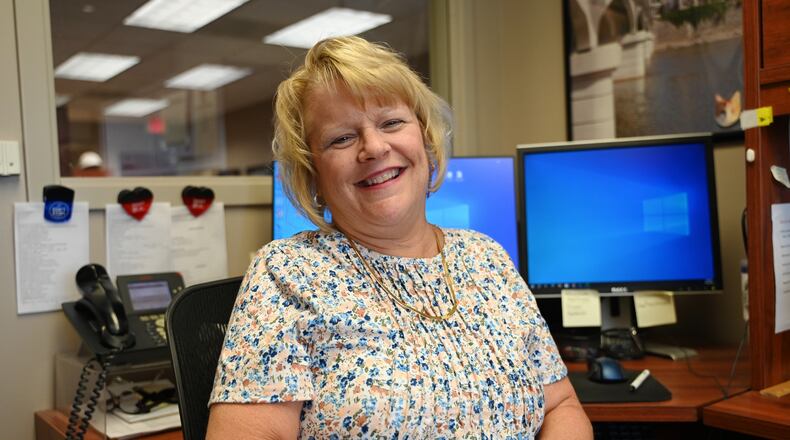“The deaths that we handle are shock and awe,” she said of the coroner’s office. “They’re sudden, and in an instant, a person is alive, then dead. Sometimes the callers are sad or mad, distraught or in shock.”
She described those dealing with a death as “a moth in a jar. They don’t know what to do. They’re lost. I wrap my history and knowledge around them. I talk them off the edge.”
On Monday morning, for one of the few times in 40 years, someone else will answer the phone calls at the coroner’s office.
Poynter, 62, a 1980 Badin High School graduate, retired Friday, ending a career that began in 1983, before taking a leave to start a family and returning in 1990.
“My job is done and it was well done,” Poynter said last week when asked why she retired. “I walk away very proud.”
During her four-decade career, she worked closely with two coroners: Dr. Richard Burkhardt, the man who hired her fresh out of school with a medical secretarial degree, and Dr. Lisa Mannix since 2012.
Dr. Mannix called Poynter “an amazing asset” to the office and “an institution” due to her work history.
Since Poynter provides “a listening ear” to grieving families, she has been invaluable to countless Butler County families, the coroner said.
Poynter has participated in 20,000 coroner cases and typed more than 5,000 autopsy reports, Dr. Mannix said. What’s even more impressive than the statistics is her ability to recall cases, the coroner said.
When Dr. Mannix has a question about a particular case, she asks Poynter, provides what information she has available, and a few minutes later, Poynter delivers the case file.
The coroner’s office has worked to develop a system in place when “our Sally is gone,” Dr. Mannix said.
Good luck with that.
You can’t replace institutional knowledge.
In 1990, Poynter left the coroner’s office to have her son, Kenny, and to operate a private business. Sally and Timothy, her husband of 35 years, have two more children, Matthew and Kristen, and two grandchildren.
After her break, she was “dealt an ace” when Dr. Burkhardt, without hesitation, hired her back, she said. She described him as a second father figure, a medical genius, a gifted writer, and a man of tremendous faith.
Working with Dr. Mannix the last 12 years, Poynter said she felt appreciated every day, particularly when she would request her opinion on a current case or when testing her memory on past circumstances.
“Laughter became the oil that kept our daily attitudes lubed,” said Poynter, adding working with Dr. Mannix she “couldn’t have asked for a more positive ending to my successful career.”
She was working with Dr. Burkhardt when she experienced her most memorable case. In 1986, just three years into her career, a Butler County man was charged with murder after his 3-year-old daughter who had been physically abused, was found dead.
When Dr. Burkhardt returned from the crime scene, he slammed his fist on Poynter’s desk, screamed “that man murdered that baby,” then stormed into his office where Poynter believes he opened his Bible for spiritual guidance.
“How she died was beyond comprehension,” Poynter said. “I couldn’t believe that it happened in my home, my county.”
One week later, the coroner apologized for his outburst and Poynter contemplated whether the coroner’s office was the best place for her to work. She never regretted staying.
“God put me here for this reason,” she said. ”He works through me to get the right words.”
About the Author

